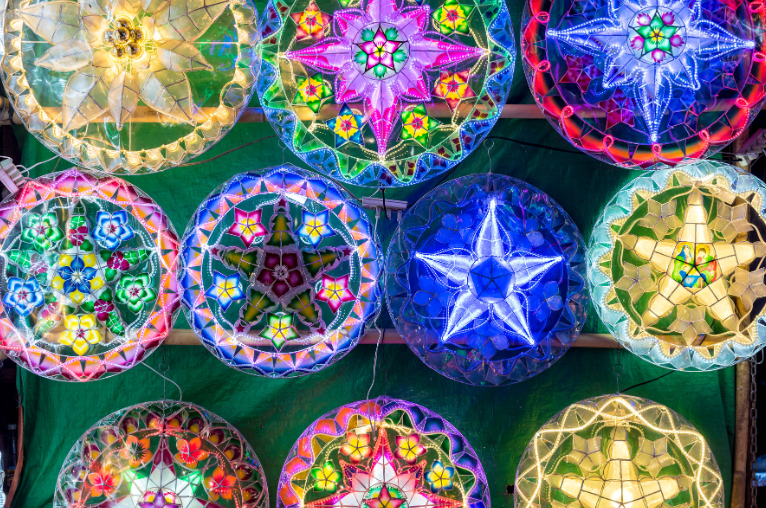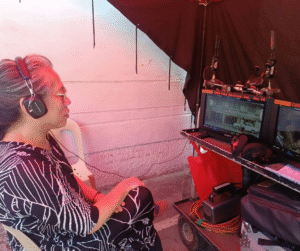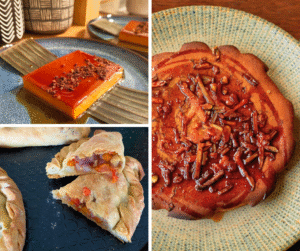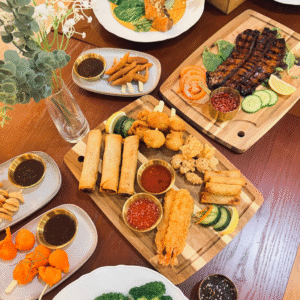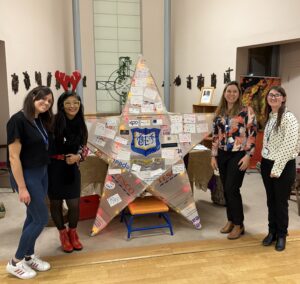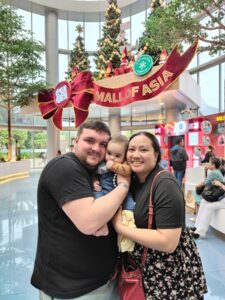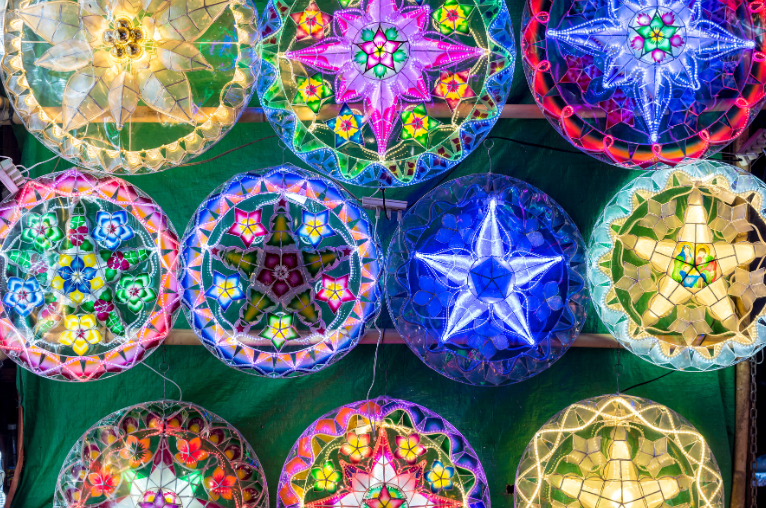
By Jacob Delos Santos
Did you know that Filipinos celebrate the longest Christmas in the world? Once the first of September kicks in, radio stations across the Philippines start playing Christmas carols to signal the start of the festive season. Families start putting up Christmas decorations and plan family reunions, if they haven’t yet scheduled it in advance.
How do Filipinos in Britain mark this festive season?
“Christmas is in our hearts – you can celebrate it anywhere,” says Luigi Crespo, Filipino language tutor and founder of the UK-based Filipino language company Ilaw Ltd.
Originally from Parañaque, Metro Manila, Luigi now celebrates the holidays in London with her husband and two young boys. This Christmas, she and her family volunteered at a feeding programme with Thomas Franks, a homeless charity based in Oxfordshire.
“Growing up in the Philippines, we would volunteer at orphanages during the holidays as a way to give back. [Christmas] is really about community. I wanted to instil that in the boys – they loved it,” she says.
Having celebrated Christmas for many years in Pasig City, Angelo describes how his festive values have been shaped by the importance of community. A master’s student of food anthropology at the School of Oriental and African Studies (SOAS), he says, “For Christmas in the Philippines, extended family will come over, such as (first) cousins, second cousins, aunts and uncles – I don’t even know half their names! I once did a headcount and there were like 30 people in my house.”
Both Luigi and Angelo talk about the absence of family members among Filipinos in Britain. Some immigrants may be lucky enough to have a complete nuclear family with both parents and their children living in the UK. However, the majority don’t have their extended family here – grandparents, uncles, aunts and cousins. The most recent 2021 UK census says that 164,962 people born in the Philippines were residents of the UK, making up only 0.2% of the British population.
Building your own extended Filipino family
Sophia, a Filipina data analyst based in Harrow, shares a similar sentiment. Whilst having celebrated Christmas in Tarlac City as a child, Sophia notes that she has “no extended family in the UK, so Christmas day will just be my parents and siblings.”
However, she goes on to describe the “Pasko sa barangay” (or Christmas in the village) party that her mum throws at the start of December every year. “This party kicks off the Christmas celebrations in my community. My mum immigrated here 20 years ago, and she’s known the people I routinely see at the party since then. They’ve seen me and my sister grow up, and I got to see them have their own kids. This community is the closest thing I have to an extended family here,” she says.
At Sophia’s family party, there’s Filipino food, Filipino songs playing in the background and everyone is speaking Tagalog or Filipino, the country’s national language.
“The party feels more like Christmas back home. I would honestly say that seeing family, even if we’re not blood relations, is my favourite part of the holidays,” she says.
Belen, simbang gabi and noche buena
Filipino Christmas and New Year’s celebrations blend indigenous, Spanish and Chinese traditions. However, Christmas remains a deeply religious event for Filipinos who have been influenced by over 300 years of Spanish Catholicism.
The belén is a prominent Christmas decoration in Filipino households. Short for Bethlehem in Spanish, it depicts the traditional nativity scene of Jesus’ birth. The city of Tarlac hosts the annual Belenismo sa Tarlac festival which boasts giant scale beléns.
In Britain, people generally celebrate on Christmas Day. But for many Filipinos across the world, Christmas celebrations typically begin on the 24th of December with the noche buena, or “the good night.” Back in the Philippines, they would attend the simbang gabi, a series of daily masses starting from December 16th, which culminate on Christmas Eve known as Misa de Gallo.
Upon returning home, the noche buena banquet is served, ringing in the miracle of Jesus’ birth. Aguinaldo, or Christmas gifts, are then exchanged. Derived from the Spanish word meaning “small gift”, the phrase originally referred to the Christmas bonus given to colonial Spanish soldiers.
Lechon, kakanin, noodles and 12 round fruits
Traditional Filipino cuisine remains a favourite for both Christmas and New Year celebrations. A popular savoury dish enjoyed during the holiday season is lechon or roasted suckling pig. For those who can afford it or those who host big parties, they have a whole lechon which serves as the centrepiece at the dinner table.
“I don’t usually cook – I probably shouldn’t say that”, laughs Luigi, “but for Christmas I will prepare food for the boys and my friends. I’ll make the classics: fruit salad, ginataang bilo bilo, lumpiang shanghai and a box of kakanin.”
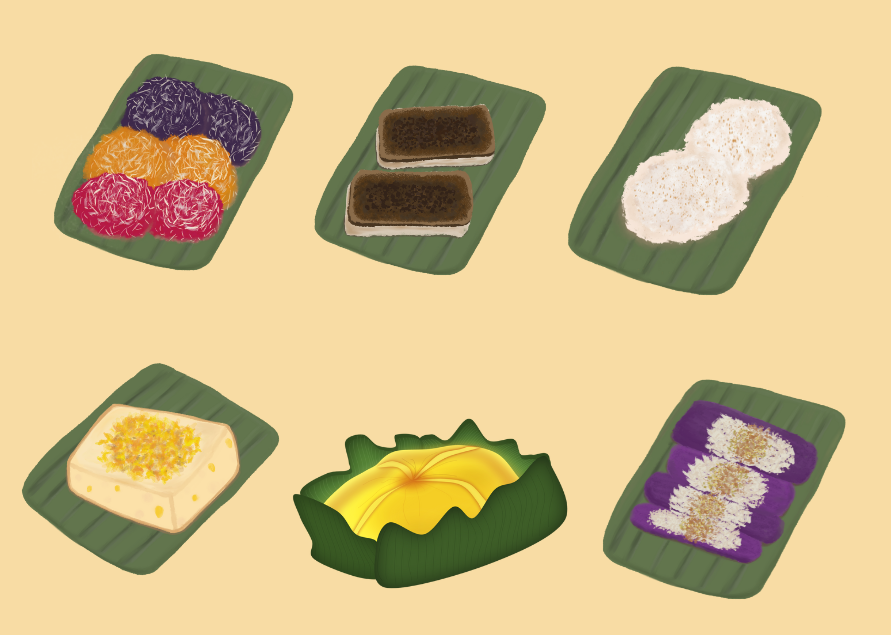
Kakanin or sticky rice cakes are a must in any Filipino gathering, especially at Christmas. Cooked mainly with glutinous rice, coconut milk and sugar, they are served to make family bonds sweeter and tighter. There is a wide variety of delectable kakanin for everyone: puto bumbong, bibingka, palitaw, suman, sapin-sapin, and a whole lot more!
Following Chinese influences, Filipinos display 12 round fruits in the belief that they symbolise prosperity for each month of the year. On various UK Facebook groups, Filipinos have been showing their fruit bowls laden with grapes, watermelons, oranges and other fruits. They extend this round motif to clothing, wearing polka dots during New Year’s Eve and New Year’s Day.
“We always serve palabok”, says Sophia. “It’s my favourite. The long length of the noodles represent long life as well as prosperity. Growing up, we would also put coins in our pocket and jump outside when midnight struck. My parents said it would make us taller.”
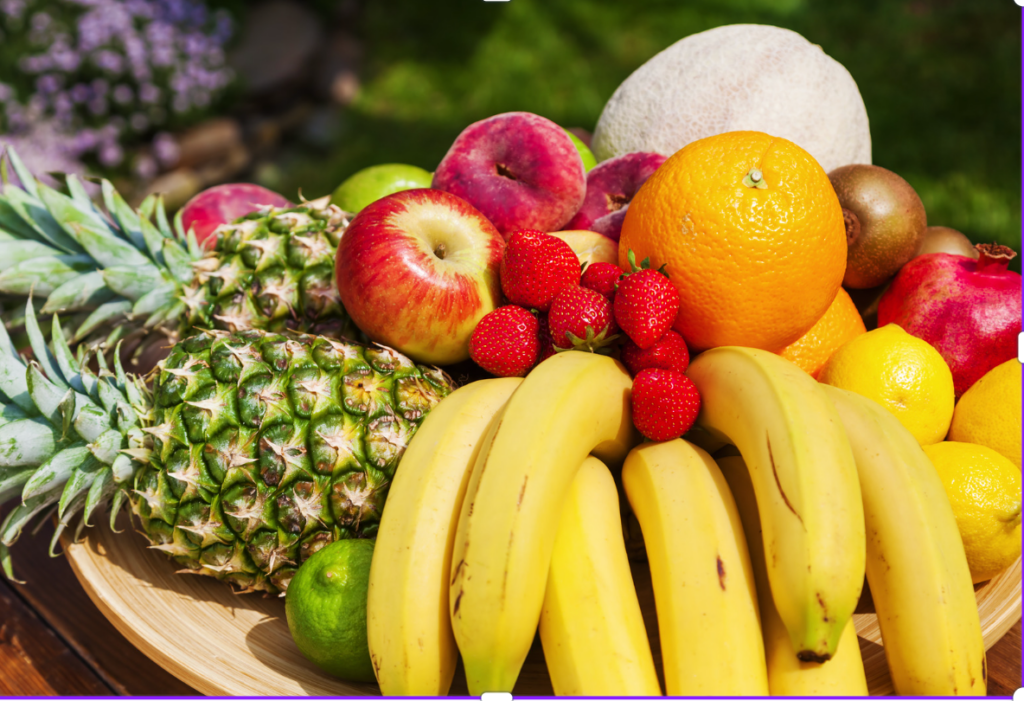
Blended holiday celebrations
It is a different experience for second-generation or those with mixed Filipino-British heritage as they navigate two or more cultures to observe the season.
Severina, a master’s student in fine arts at Goldsmiths, describes her experience with Christmas. “My mum is from Lapu Lapu and my dad is British. Growing up in Basingstoke meant that I would spend most Christmases with my dad’s side.”
She goes on to detail insights between UK and Filipino culture as a mixed Filipina: “It’s a white Christmas but with Filipino colourings.” She explains that they usually celebrate Christmas in the British way with her dad’s family which can be a bit challenging for her mum.
“My mum is always super eager to help and cook — very family-oriented. My dad’s family, on the other hand, is very reserved. They’re not as open to alter traditions. I find it hard to insert biko (rice cake) into the menu. I can’t find that merge.”
But on New Year’s Day, Severina celebrates a more traditional Filipino meal. “My mum cooks adobo and prepares a bowl of 12 round fruits. I’m not superstitious, but I’m happy to keep up the ideas. I know how important they are to my mum.”
Whilst holiday celebrations in both the Philippines and the UK share core traditions, practices vary among families. “The most important thing is to not compare,” insists Severina. “There is beauty in realising the fusion of a Filipino UK Christmas. It is a special and unique holiday experience.”
Luigi sums up the meaning of Christmas. “What makes Christmas special? More material things?” she asks. “What do you want in life? Maybe it’s my age,” she laughs. “I have a home, I have heating during the cold, I have food on the table. Life is peaceful. Think of Palestine, Ukraine, Russia, Syria. There is just unimaginable suffering. Be grateful for what you do have. I can’t ask for anything more.”
For Filipinos everywhere, being with family and friends and sharing the food they love in the spirit of community is the essence of Christmas.
About the author:

Jacob is a master’s student at SOAS, University of London. Born in Marikina City, he now lives in Oxfordshire, working in medical advertising at IPG Health.
Jacob enjoys anime, reading, swimming and cooking vegan Asian food. His favourite food is fresh mango, most specifically from his home province of Zambales.

